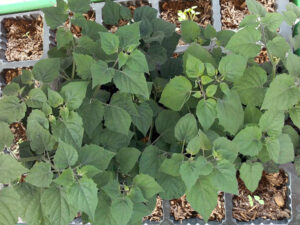
When I admired my son’s gooseberries, he suggested I grow some for myself. ‘I guess I can sacrifice these,’ he said as he handed me a couple of rather dry fruit, neglected at the back of the bush. Is it a sacrifice if he wasn’t going to use them anyway?
I took the seeds home and dried them. I set up a seed tray and planted as many cells as I thought I could manage. Should I sacrifice the remainder of the seeds or put them aside for later? Would they be any use to someone else? I decided to discard them – not really a sacrifice as I was confident I’d be able to save seeds from my crop.
The strike rate was phenomenal! Many of the cells were overcrowded with seedlings. I counted up to 14 little plants in one cell. I didn’t have a spare 20 acres to turn into a gooseberry field. Gardening gurus tell us in these circumstances, we should sacrifice the smaller plants to allow the bigger stronger plants to flourish. If I have no use for these extra plants, is it really a sacrifice?
I started thinking about other instances in my life that have been referred to as sacrifices. I sacrificed my career to be a stay-at -home mother. I’ve never regretted my decision. I sacrificed time to help out at church, to give young mothers free sewing lessons, to serve on the committee of the writing group and so on. I do not believe these actions were sacrifices as I was amply rewarded with friendship, fellowship and fulfilment.
My son said he organised salary sacrifice to buy a car, and a friend refused to work longer hours if it meant she’d have to sacrifice her social life.
We use the word rather loosely, don’t we? Let’s pause and think of the true meaning of sacrifice – giving up some highly-valued, precious thing for the good of others. Think of the tragic loss of a fireman or emergency worker fighting to save the community, a soldier protecting our country. At Easter, Christians remember Christ’s perfect sacrifice – giving his life for us.
Susan Skowronski





